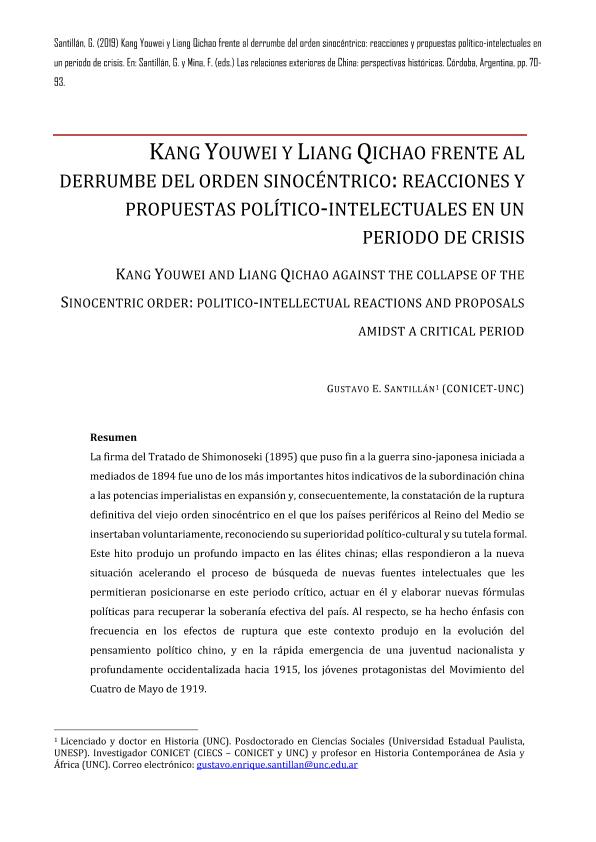Mostrar el registro sencillo del ítem
dc.contributor.author
Santillan, Gustavo Enrique

dc.contributor.other
Santillan, Gustavo Enrique

dc.contributor.other
Mina, Federico Daniel

dc.date.available
2020-12-02T17:20:09Z
dc.date.issued
2019
dc.identifier.citation
Santillan, Gustavo Enrique; Kang Youwei y Liang Qichao frente al derrumbe del orden sinocéntrico: reacciones y propuestas político-intelectuales en un periodo de crisis; Universidad Nacional de Córdoba. Facultad de Filosofía y Humanidades; 2019; 70-93
dc.identifier.isbn
978-987-707-131-3
dc.identifier.uri
http://hdl.handle.net/11336/119640
dc.description.abstract
La firma del Tratado de Shimonoseki (1895) que puso fin a la guerra sino-japonesa iniciada a mediados de 1894 fue uno de los más importantes hitos indicativos de la subordinación china a las potencias imperialistas en expansión y, consecuentemente, la constatación de la ruptura definitiva del viejo orden sinocéntrico en el que los países periféricos al Reino del Medio se insertaban voluntariamente, reconociendo su superioridad político-cultural y su tutela formal. Este hito produjo un profundo impacto en las élites chinas; ellas respondieron a la nueva situación acelerando el proceso de búsqueda de nuevas fuentes intelectuales que les permitieran posicionarse en este periodo crítico, actuar en él y elaborar nuevas fórmulas políticas para recuperar la soberanía efectiva del país. Al respecto, se ha hecho énfasis con frecuencia en los efectos de ruptura que este contexto produjo en la evolución del pensamiento político chino, y en la rápida emergencia de una juventud nacionalista y profundamente occidentalizada hacia 1915, los jóvenes protagonistas del Movimiento del Cuatro de Mayo de 1919. Teniendo este resultado final en mente, en este trabajo destacaremos el hito constituido por el Tratado de Shimonoseki. 1895 es justamente el año de elevación exitosa del primer Memorial al Trono Imperial escrito por Kang Youwei, mentor del Movimiento de la Reforma de los Cien Días (1898). El discípulo más prominente de Kang, también protagonista del movimiento mencionado, Liang Qichao, adquirió por otra parte entidad y relieve propios en sus escritos políticos. Japón había sido asimismo el lugar de exilio de los reformistas de 1898 tras su represión por el golpe de Estado conservador de la Emperatriz Cixi, amén de enemigo, modelo a imitar y parte interesada en la desestabilización política del Imperio Qing. A través de un recorrido por la biografía político-intelectual de Kang Youwei y de Liang Qichao, nuestro trabajo pretende poner de relieve la fluidez de las relaciones entre las élites chinas en un periodo de crisis, así como las continuidades, matices y préstamos ideológicos evidentes en las intervenciones de las figuras mencionadas; finalmente, se aludirá al papel complejo de Japón en el escenario delineado.
dc.description.abstract
The signature of the Shimonoseki Treaty (1895), which concluded the Sino-Japonese War started by mid-1894, was one of the major milestones indicating the Chinese subordination to the expansive imperialist powers and, consequently, the proof of a definitive break of the old Sinocentric order in which the peripheral countries voluntarily submitted, thereby acknowledging the political and cultural superiority of the Middle Kingdom, as well as its formal tutorship over them. This milestone produced a deep impact on the Chinese elites; they responded to the new situation by intensifying the search process of new intellectual sources allowing to relocate themselves in the midst of this critical period, to act within this context, and to elaborate new political formulae aiming at recovering the country’s effective suzerainty. Regarding this, it was frequently emphasized on the rupture effects produced by this context in the Chinese political thought evolution, and on the swift emergence of a Nationalist and deeply Westernized youth by 1915, i.e. the young protagonists of the 1919 May Fourth Movement. Having this final outcome in mind, in this work we will highlight the Shimonoseki Treaty as a milestone. 1895 is actually the successful elevation year of the first Memorial to the Imperial Throne written by Kang Youwei, mentor of the Hundred Days Reform Movement (1898). Kang’s most prominent pupil, Liang Qichao, also actor of the above-mentioned movement, acquired on his behalf proper entity and setoff on its political writings. Japan was also the exile place of the 1898 reformers after their movement’s suppression by the conservative coup d’etat staged by the Cixi Dowager Empress, as well as enemy, role model and interested party in the Qing Empire political destabilization. By means of a tour throughout the politico-intellectual biography of Kang Youwei and Liang Qichao, our work proposes to highlight the fluidity of the Chinese elites’ relationship in the midst of a crisis period, as well as the continuities, nuances and ideological borrowings evident in the mentioned characters interventions; finally, we will allude to the complex role of Japan in the outlined scenario.
dc.format
application/pdf
dc.language.iso
spa
dc.publisher
Universidad Nacional de Córdoba. Facultad de Filosofía y Humanidades

dc.rights
info:eu-repo/semantics/openAccess
dc.rights.uri
https://creativecommons.org/licenses/by-nc/2.5/ar/
dc.subject
CHINA
dc.subject
INTELECTUALIDAD
dc.subject
ORDEN SINOCÉNTRICO
dc.subject
CRISIS
dc.subject
RESPUESTAS POLÍTICO-INTELECTUALES
dc.subject.classification
Historia

dc.subject.classification
Historia y Arqueología

dc.subject.classification
HUMANIDADES

dc.title
Kang Youwei y Liang Qichao frente al derrumbe del orden sinocéntrico: reacciones y propuestas político-intelectuales en un periodo de crisis
dc.title
Kang Youwei and Liang Qichao against the collapse of the sinocentric order: politico-intellectual reactions and proposals amidst a critical period
dc.type
info:eu-repo/semantics/publishedVersion
dc.type
info:eu-repo/semantics/bookPart
dc.type
info:ar-repo/semantics/parte de libro
dc.date.updated
2020-11-17T16:01:29Z
dc.journal.pagination
70-93
dc.journal.pais
Argentina

dc.journal.ciudad
Córdoba
dc.description.fil
Fil: Santillan, Gustavo Enrique. Consejo Nacional de Investigaciones Científicas y Técnicas. Centro Científico Tecnológico Conicet - Córdoba. Centro de Investigaciones y Estudios sobre Cultura y Sociedad. Universidad Nacional de Córdoba. Centro de Investigaciones y Estudios sobre Cultura y Sociedad; Argentina
dc.relation.alternativeid
info:eu-repo/semantics/altIdentifier/url/https://rdu.unc.edu.ar/handle/11086/15358
dc.conicet.paginas
308
dc.source.titulo
Las relaciones exteriores de China: perspectivas históricas
Archivos asociados
